- Home
- H A CULLEY
The Bastard's Son Page 4
The Bastard's Son Read online
Page 4
Spring 1088
The weather deteriorated again as soon as Hugo and Guillaume returned to Castle Peverel and so it wasn’t until the end of February that Hugo was able to make the journey to Lincoln. He and Edith had moved into the hall at Peak’s Cavern below the castle, much to the displeasure of the bailiff there. He had a small house in the village but he had nine children so it was somewhat overcrowded. Hugo didn’t like evicting the family but he and Edith had to live somewhere.
During the winter Oswin and his family had arrived at Peak’s Cavern, having been forced to vacate the castle at Burneham by the new lord of the manor. It had been a dreadful journey through the snow and the children, in particular, had been lucky to survive. It was one more grievance that Hugo held against King William.
Oswin and Wulfric were Rowena’s brothers who Hugo had left to look after the castle and manor at Burneham when he had moved up to the High Peak. Oswin was married and had two children but Wulfric, Rowena’s twin, had remained a bachelor. Hugo had no desire to see them treated as Saxon peasants so he had knighted both brothers and made them members of his mesnie. Wulfric slept in the hall with the other household knights, the serjeants, men-at-arms and the servants but he invited Oswin’s family to share the solar with him and Edith for the time being. Eventually he intended to make Oswin the tenant of Peak’s Cavern after he and Edith had moved to Edale. However, that wouldn’t be for some time as Herbert would need time to build himself a house in the village suitable for a steward.
Hugo took Simon, Wulfric and a small escort with him. Although Wulfric and Rowena had been fraternal, not identical, twins, they had looked quite similar and Wulfric’s presence was now a daily reminder of his dead wife.
He intended to ask de Muschamp to take Oswin’s two boys, who were aged nine and ten, as pages to strengthen the alliance he hoped to make with his neighbour to be. For the moment they served Edith and their mother and the boys had begun to learn basic military skills with Roland, who had been his squire years ago and was now the captain of his mesnie.
One of his escort as a knight called Sweyn, a Saxon who, as a young boy, he had captured during the invasion of 1066. He was now in his early thirties. He had been Hugo’s squire and he had knighted him as soon as he reached twenty-one. Having three Saxons in his mesnie would be frowned upon by his fellow Normans, but that didn’t bother Hugo overmuch. His own sons were half Saxon and he had found most Saxons to be better people on the whole than most Normans.
When Lincoln came in sight Hugo was impressed. The castle and the cathedral sat on top of a hill which arose from the flatlands around it with the town scattered on the slopes below. The castle was unusual in that it had two mottes. On one stood a stone-built lookout tower and on the other a large timber keep. The curtain wall surrounding the two mottes was also built of stone. He later learned that the castle had originally been a Roman fortress and the curtain wall around the bailey and the tower had been built with stone taken from the Roman ruins.
He had sent a messenger ahead and Roger de Muschamp was waiting outside the keep to greet them himself. As seneschal, he was in charge of the domestic management of the castle. In smaller households this would be left to the chatelaine, usually the lord’s wife, but in great households like the Earl of Lincoln’s the countess was a lady of leisure and de Muschamp ran the household.
The earl and the countess were away so the seneschal introduced Hugo to the constable, who was responsible for the defence of the castle, and then a page showed him and Simon to their room. This was in the base of the watchtower and was barely eight foot square. The room above was the guardroom for those on duty in the tower and both rooms only had arrow slits for windows. Needless to say, the windswept hilltop position, the stone walls and the absence of any form of heating all contributing to making the place bitterly cold. True, there was a brazier standing in front of one of the arrow slits but, as the wind was blowing directly in through the slit, they would die of asphyxiation if it was lit. Hugo decided there and then to conclude his business with de Muschamp as swiftly as possible.
‘What brings you to Lincoln, Sir Hugo,’ Roger de Muschamp asked him over the evening meal.
As a guest he sat with Roger at the high table with the constable and their two wives. It was a normal meal for winter time: pigeons from the dovecote and rabbits from the warren were the only meats available, but there were plenty of root vegetables and bread, all washed down with a rather rough red wine. Simon knelt to serve him and he took a selection of meat from the platter, namely a pigeon leg and a slice of rabbit breast. He left the rest for Simon to eat, if someone else didn’t get to it first. Simon had to return with a wine flagon once he had placed his food on the squires’ table for later and then stood behind his master ready to top up his goblet when required.
The squires of the seneschal and the constable were more fortunate. There were several pages, boys of noble or knightly birth aged between nine and thirteen, whose duty it was to serve wine to the two main officers of the castle and their wives. Thus the other squires were off duty as soon as they had served the food to their betters. Simon watched resignedly as they plundered the platter he had hoped to eat himself.
‘I understand that you have been granted manors in Northumberland and that they are adjacent to mine,’ Hugo began.
‘Yes, Wooler, Glendale, Ford, Etal, Barmoor and Belford. From what I can gather Wooler is the main town in the area but Glendale is a wild land on the eastern edge of the Cheviots with a scattering of small villages and hamlets. The other manors are in reality small villages with no hall house. The people are mainly Angles and Danes, rather than Saxons, and at the moment Wooler and the surrounding lands are ruled by a man called a jarl. If I want to establish myself as their master I will have to defeat his men and depose this jarl.’
‘I suspect that I am in a similar situation. There is no main town in the vast wilderness of the Cheviots. The king is pleased to have decided that it forms six manors but, in truth, although my estate covers a vast area, it is just a scattering of small villages, hamlets and isolated farmsteads. There is a ford over the Tweed at Wark and I am charged to build a castle there to stop the Scots from raiding into Northumberland.’
‘I see. There is another ford at Norham, I gather, which is in the enclave belonging to the Bishop of Durham, but the current bishop, William de St-Calais, spent most of his time with the old king as one of his advisors and so the north has been neglected. Things are unlikely to change immediately as I hear he’s to be a member of the new king’s council. Perhaps William can persuade him to divide his time between the court and the north?’
‘I doubt it,’ Hugo grunted. ‘I really can’t see much point in building a castle to stop them from crossing the Tweed at Wark if they can do so at Norham.’
‘At least it might encourage them to raid the Durham enclave instead of raiding your lands?’
‘If they do that, then several of your manors lie due south of the enclave.’
‘True, but I intend to build a castle at Wooler, which lies at the head of Glendale, to protect my estates.’
‘But first we have to establish ourselves as lords of our new manors,’ Hugo pointed out. ‘I wondered whether we might not assist each other in that enterprise.’
Before he could reply the constable’s wife, having got bored and feeling neglected, interrupted with a question about Derbyshire, and so the two men left it there until the morrow.
-X-
Hugo left Lincoln well pleased two days later. Roger had agreed to his idea of a joint expedition to establish themselves in their new manors. Furthermore he had agreed to take one of his nephews, Oswin’s son, as a page. Being seneschal his wife hadn’t needed pages of her own but she would now she was to be chatelaine of Wooler, once her husband had secured the place.
He hoped that Yves de Vesci would accept Oswin’s other son, the nine year old Edwin. If not he could stay with his own household. As he wasn’t married and Edith
wasn’t a lady he couldn’t really call him a page so he would have to be classed as a servant, but he would promise the boy that he could become a squire as soon as he reached fourteen.
He had already decided make Oswin the lord of the manor of Peak’s Cavern. It would reduce his own income but it would be some recompense for the loss of Oswin’s position at Burneham. He would need Herbert, the steward, with him but he could travel back to Derbyshire from time to time to conduct his business there. It wasn’t ideal but many stewards to lords with widespread lands spent a lot of time on the road. He had also decided to make Roland lord of the manor of Hathersage as reward for his long service. Baldwin, who had joined him during the Harrying of the North in 1069 would make a good captain of his mesnie in his place.
Having decided on who to leave, he then deliberated on how many he would need to take with him. He had no delusions that securing his new lands would be easy. The Angles and the Danes were fierce peoples and, unlike the Saxon peasants, every man started training as a warrior from boyhood.
Apart from Baldwin, Tomas, Wulfric and Sweyn, there were six serjeants he could take north with him. He would need a few more knights but that still wouldn’t be enough. Men-at-arms would be useful when he had built a castle, but not initially. The freemen from his manors normally provided spearmen and archers when needed, but none of them could ride and it was horsemen he would need in the vast tracts of the Cheviot Hills.
Thankfully his horse breeding stud at Edale had provided him with a sizeable hoard of silver over the years and he had managed to save a few chests of coins from his other manors as well. He would have to hire mercenaries to serve as mounted crossbowmen. The Flemings were usually the best at this role so he set off for Nottingham to see if he could recruit a few there.
He took Sweyn with him as escort as he was carrying a bag of silver to pay a bounty to those he managed to recruit. Sweyn was without a squire at the moment as the last one had died of a fever a few weeks previously, so Simon volunteered to look after him as well. Sweyn insisted it wasn’t necessary; he was quite capable of looking after his own horse, armour and weapons but Hugo said it was inappropriate for him to do that himself as a knight.
Nottingham appeared to be awash with soldiers of various types. When Hugo heard that Odo of Bayeux was there he began to understand the reason. Odo was plotting revolt and the new Sheriff of Nottingham was in it up to his neck. He immediately forgot about recruiting mounted crossbowmen and retraced his steps to warn Guillaume. He wouldn’t be going to Northumberland in the near future, not with a civil war in the offing.
Chapter Three – The Great Revolt
Summer 1088
William Rufus paced up and down in front of the new fireplace which had been built in the great hall of Winchester Castle. Most of his nobles had attended court at Winchester for the Easter services and the Great Council which followed, but the king realised later that this had merely given his enemies the opportunity to meet and plot against him.
He now knew that his untrustworthy uncle Odo had gathered several important nobles and one or two bishops to his side. They had openly declared his brother Robert as the lawful king and taken to the field all over England. Of the chief magnates only Hugh of Chester, the Earl of Richmond and William de Warenne remained loyal.
The one glimmer of hope lay in the fact that the new sheriffs he had appointed and those he had confirmed in post remained loyal for the most part. This was vitally important because they were responsible for raising and commanding the shire levies. It seemed somewhat ironic that a Norman king was dependent on the Saxon population his father had oppressed to retain his crown.
Then came the first piece of good news. The Saxon Bishop of Worcester and the Norman Sheriff of the county had raised an army to confront the troops of the Earl of Shrewsbury drawn from his manors in Herefordshire and Shropshire and had beaten them decisively.
‘My lords, our top priority is to secure London and the South East. That way we can prevent my brother Robert from landing.’
William was addressing his war council, having travel in great haste to the capital to secure the city. He had summoned them to meet in the Tower of London and his army was busy assembling in the fields to the east of the city.
‘William,’ I want you to hold the Tower for me and prepare London for a siege, should it come to that.’
William de Warenne nodded and the king turned to Alan of Richmond. If we can capture Odo the revolt will falter. The latest reports have him at Rochester and so that’s where we’ll head with the army tomorrow.’
‘What about Tonbridge, sire?’
William thought for a moment.
‘You’re quite right, Alan. We daren’t bypass the castle there. Let’s hope we can take it quickly and then press on to Rochester.’
-X-
Hugo yawned and stretched. He was still tired after the long ride down from the north of Derbyshire and lay on his straw palliase for a moment listening to the sounds of an army camp waking up to the new day. Simon brought him some hot water and he soaped and scraped at the stubble on his face with a sharp bladed knife. Many Normans now sported beards and let their hair grow long like the Saxons but Hugo preferred to be clean shaven and kept his hair short.
He had solved the problem of a squire for Sweyn by asking Oswin to agree that Edwin could act as the knight’s body servant. The boy was four of five years too young to be a squire, but he could look after the horses, clean his knight’s armour and sharpen his weapons. Of course, the boy was delighted to be in a war camp instead of being left in the solar at Castle Peverel with the ladies like his brother, Leofric, who wouldn’t be able to take up his new post with Lady de Muschamp until the family eventually moved north to Northumberland.
Edwin wasn’t the only boy around his age in the camp. There were scullions and cook’s boys, village boys brought along to look after the archers and infantry from various manors and those who acted servants to the sergeants and professional men-at-arms and crossbowmen. However, they were all envious of him because he only had one master and he was a knight. They were all at the beck and call of many.
The next morning was chaotic. Edwin and Simon ran to the horse lines to collect their master’s and their own horses. They had to help their knights into their armour, take down the tents and pack everything onto the packhorses, tie lances and spare weapons securely to them, and then get themselves ready to follow their knights to the muster point. Simon was riding a palfrey but was leading Hugo’s main warhorse, a destrier, as well as the packhorse. At least Edwin only had to contend with a packhorse as Sweyn only had one warhorse - his destrier. They were valuable animals, heavy and aggressive, best suited to battle not a long march. Hugo had a choice and so he opted to ride the courser, leaving Simon to cope with the feisty destrier.
Eventually the army set off. It was chilly but fine but it took over an hour before the rear guard finally followed the rest out of the campsite. By then the vanguard, commanded by the Guillaume Peverel and containing Hugo and his men, were several miles down the road. Hugo had brought thirty men with him, in addition to his own knights and serjeants but the foot archers, men-at-arms and peasants armed with spears and axes were allocated to other units of similarly armed men. Hugo’s mounted men – four knights including himself and six serjeants had been supplemented by another six knights and ten serjeants to make up a conroy which he commanded. Guillaume didn’t know many of the other conroy commanders well in his command of two hundred and fifty horsemen so Hugo was given the job of riding point and pushing out his serjeants as scouts.
On the first day the army covered a mere twenty miles, much to the king’s frustration, and they camped that night eight miles short of Tonbridge. The next day they arrived outside the town and proceeded to besiege the castle. Once the mangonels had been set up, the bombardment started.
Simon and Edwin watched the rocks being hurled at the gates of the castle until dusk stopped operations for the day. The
bombardment continued all through the next day until the gates were all but destroyed. At that point the constable hauled down the banner of Odo as Earl of Kent – a single lion passant guardant on a red field - and surrendered.
‘Well, where is my blasted uncle if he isn’t at Rochester?’
William was not best pleased to be told that Odo had left Rochester the previous day.
‘Sire, we aren’t sure but the rumour is that he had gone to Pevensey on the coast to await the arrival of your brother, Duke Robert,’
‘Yes, I’m well aware where Pevensey is!’ the king said testily. ‘It seems logical I suppose.’
The king thought for a moment and then turned to the Earl of Richmond.
‘Alan, send word to the fleet at Dover and tell them to move to Pevensey and lie in wait for the fleet from Normandy. Perhaps we can intercept my bloody brother and stop him from landing. With any luck he might even manage to drown himself and save us all a lot of bother.’
The following day the army set off for Pevensey. This time the weather wasn’t so kind to them and it drizzled most of the way there. Hugo was glad to be in the van of the army. He imagined that the rear guard would be wading through mud inches deep by now.
Pevensey Castle didn’t prove to be as easy a nut to crack as Tonbridge. It was protected on one side by the sea and its walls were thick. The gates were protected by barbicans – protruding walls built at a right angle so that they were hidden from the mangonels. William settled down to starve the garrison into surrender. The sight of his uncle’s banner flying above the keep convinced him that Odo was inside and he wasn’t to be deflected from the siege, even when reports of significant gains by the rebels elsewhere in the country began to trickle in.
One of the first things William Rufus had done after arriving had been to build a watch tower so that a lookout could be kept on the sea. After a month the sharp eyed sentry called down that a large fleet had appeared over the horizon and was approaching the coast. Shortly afterwards he added that the English fleet was moving to intercept it.

 The Wolf and the Raven
The Wolf and the Raven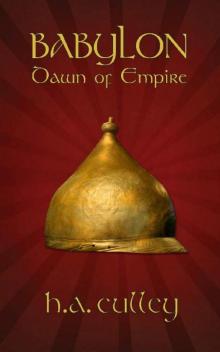 Dawn of Empire
Dawn of Empire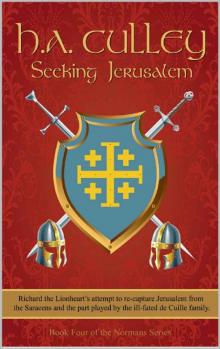 Seeking Jerusalem
Seeking Jerusalem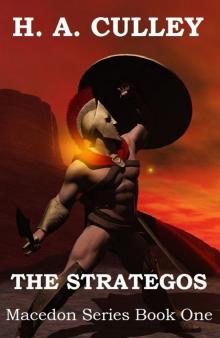 The Strategos
The Strategos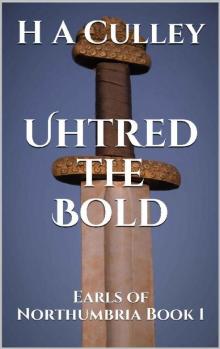 Uhtred the Bold
Uhtred the Bold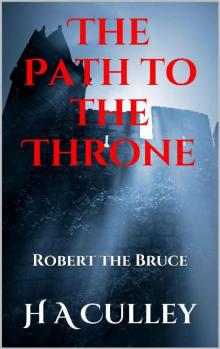 The Path to the Throne
The Path to the Throne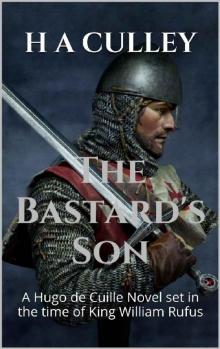 The Bastard's Son
The Bastard's Son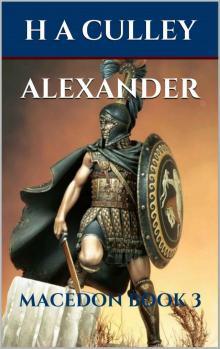 Alexander
Alexander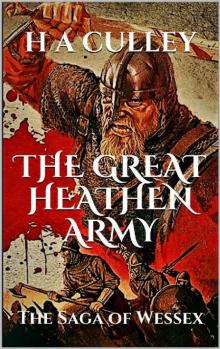 The Great Heathen Army
The Great Heathen Army The Sacred War
The Sacred War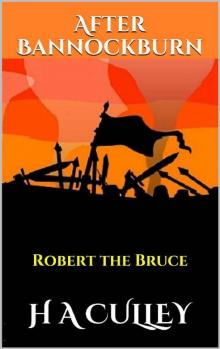 After Bannockburn
After Bannockburn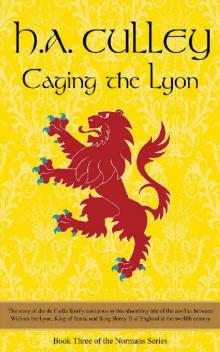 Caging the Lyon
Caging the Lyon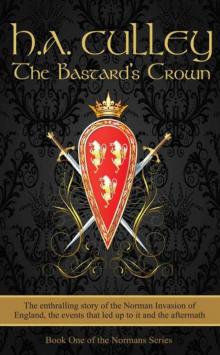 The Bastard's Crown
The Bastard's Crown WHITEBLADE
WHITEBLADE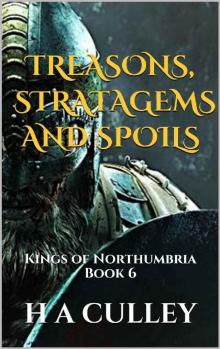 TREASONS, STRATAGEMS AND SPOILS: Kings of Northumbria Book 6
TREASONS, STRATAGEMS AND SPOILS: Kings of Northumbria Book 6 THE POWER AND THE GLORY: Kings of Northumbria Book 4
THE POWER AND THE GLORY: Kings of Northumbria Book 4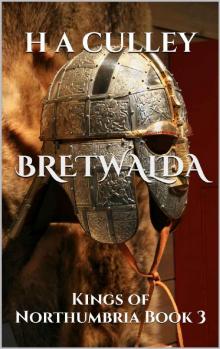 BRETWALDA: Kings of Northumbria Book 3
BRETWALDA: Kings of Northumbria Book 3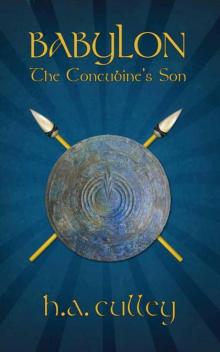 The Concubine's Son
The Concubine's Son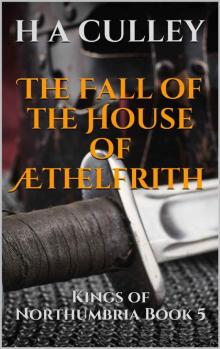 The Fall of the House of Æthelfrith: Kings of Northumbria Book 5
The Fall of the House of Æthelfrith: Kings of Northumbria Book 5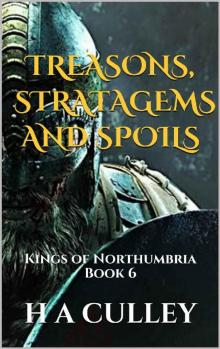 TREASONS, STRATAGEMS AND SPOILS
TREASONS, STRATAGEMS AND SPOILS THE POWER AND THE GLORY
THE POWER AND THE GLORY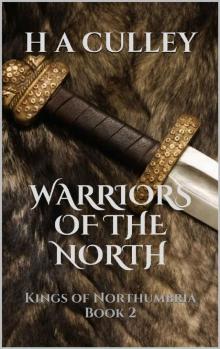 WARRIORS OF THE NORTH
WARRIORS OF THE NORTH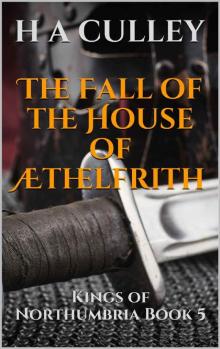 The Fall of the House of Æthelfrith
The Fall of the House of Æthelfrith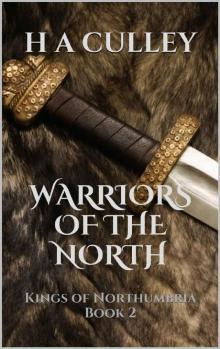 WARRIORS OF THE NORTH: Kings of Northumbria Book 2
WARRIORS OF THE NORTH: Kings of Northumbria Book 2 WHITEBLADE: Kings of Northumbria Book 1
WHITEBLADE: Kings of Northumbria Book 1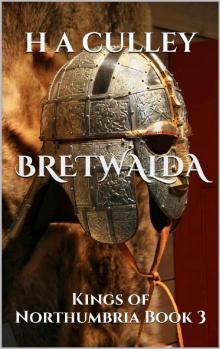 BRETWALDA
BRETWALDA